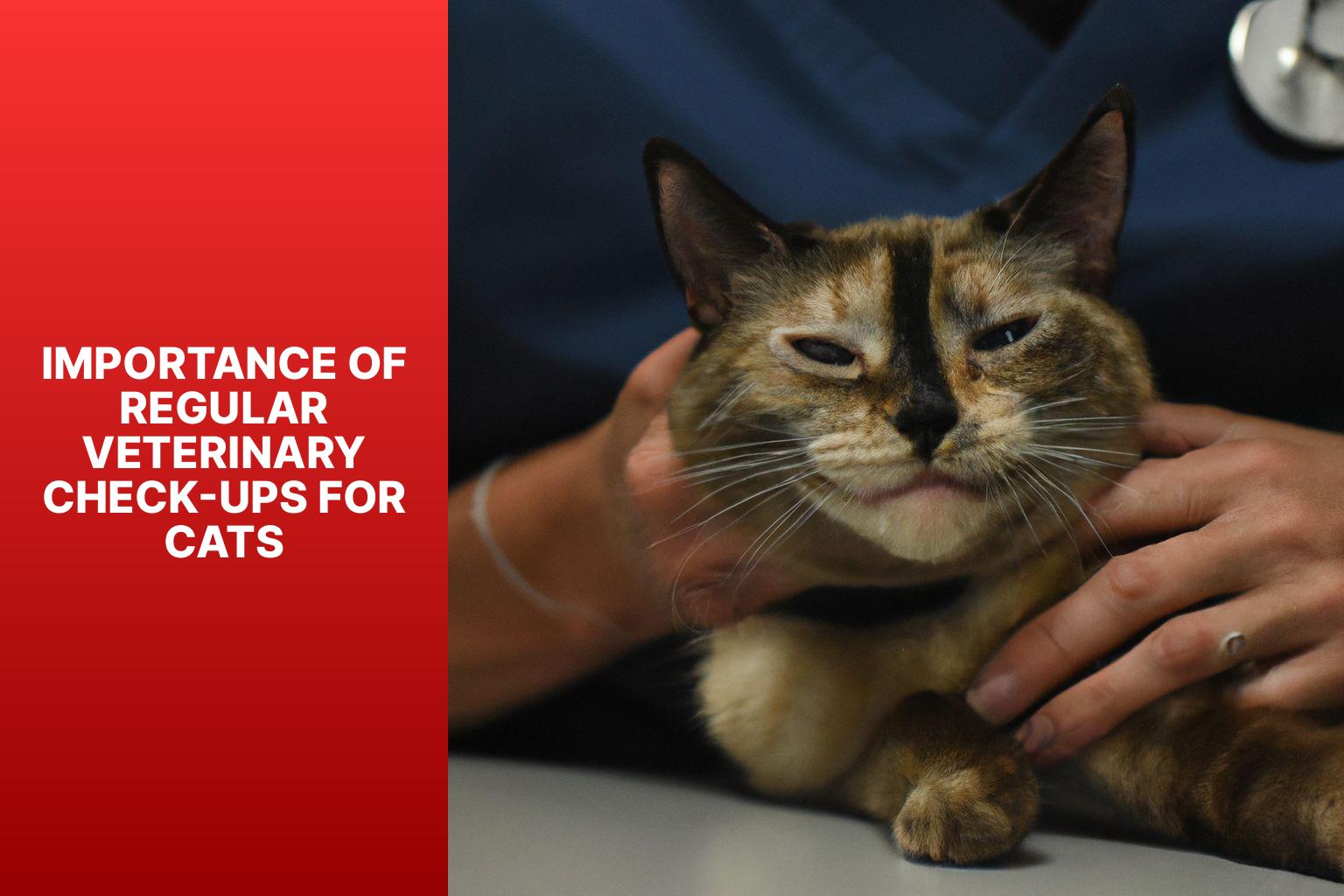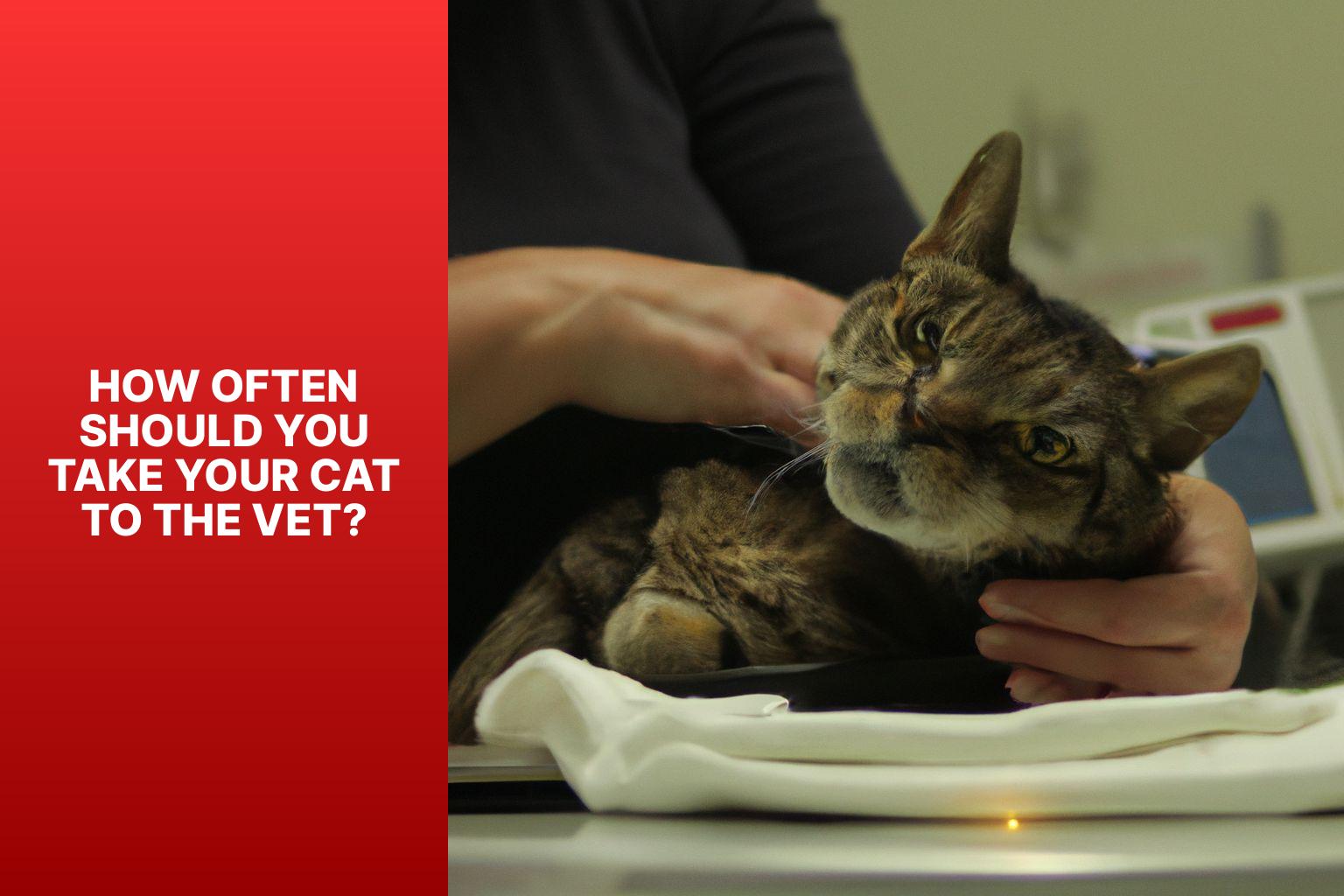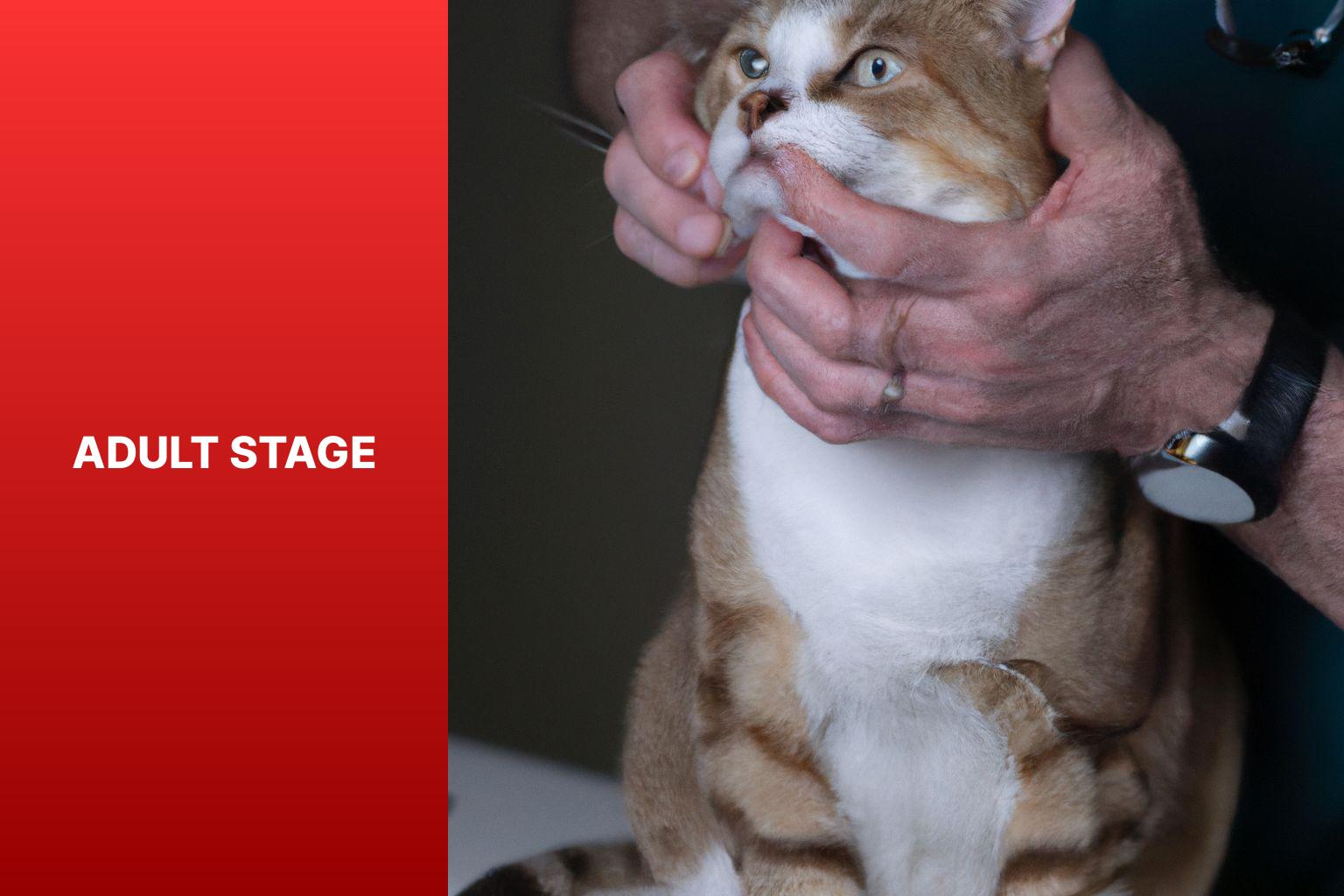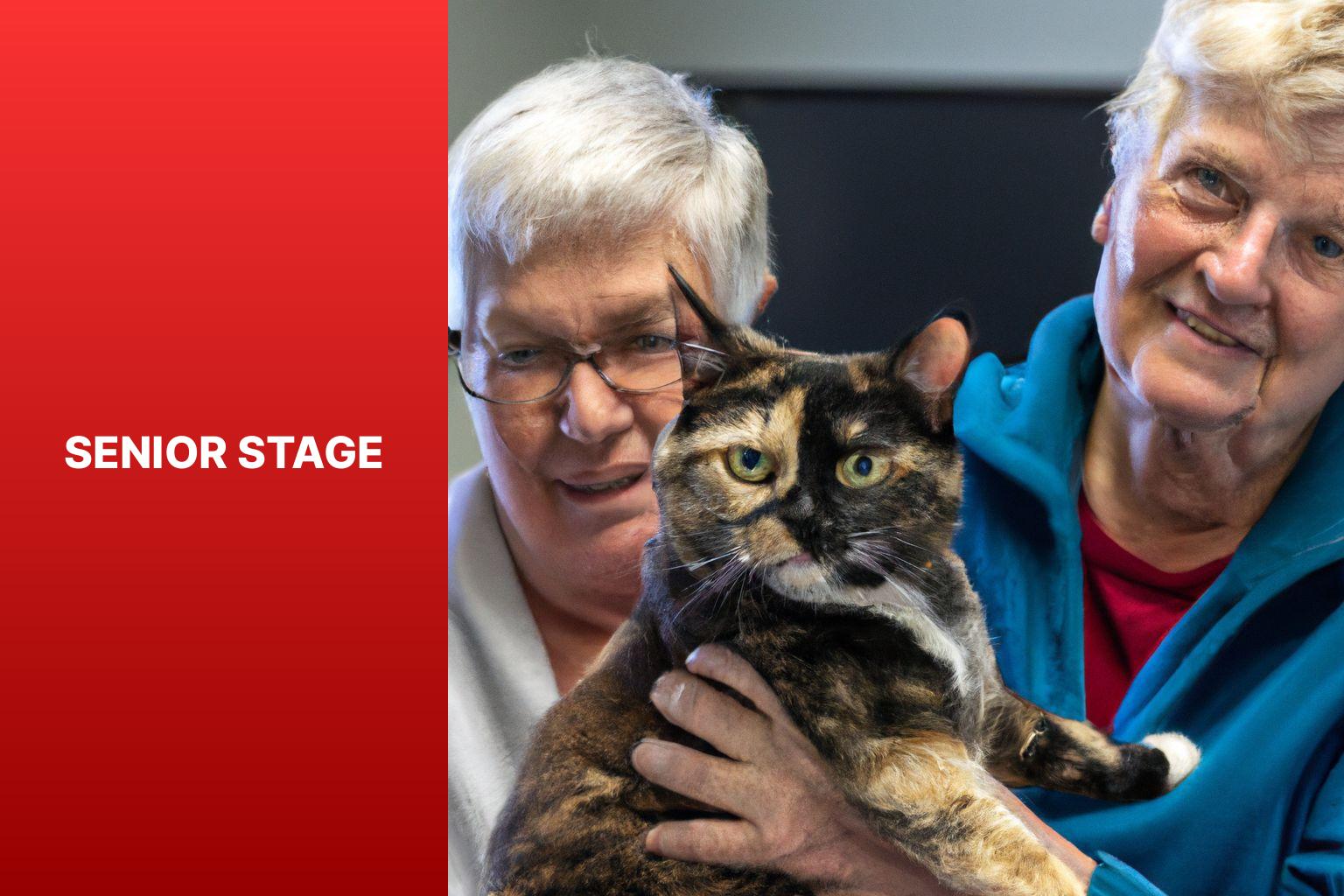Taking your cat to the vet is vital for their overall health and well-being. Regular veterinary check-ups play a crucial role in maintaining their health and detecting any potential health issues early on. This article will provide insights into the importance of regular vet visits for cats and guidelines on when and how often you should take your cat to the vet.
Annual Check-ups: Annual check-ups are essential to ensure that your cat receives a comprehensive examination, including vaccinations, to protect against common diseases.
Signs of Illness or Injury: It is crucial to take your cat to the vet if they display any signs of illness or injury, such as loss of appetite, lethargy, changes in behavior, or noticeable physical changes.
The frequency of vet visits depends on the different life stages of your cat. During the kitten stage, more frequent visits are necessary to monitor their growth, vaccination schedule, and overall development. As your cat enters the adult stage, annual check-ups are typically sufficient. In the senior stage, cats may require more frequent visits to address age-related health concerns.
A routine veterinary visit for cats usually includes a thorough physical examination to assess their overall health, vaccinations, preventive care measures, such as flea and tick control, and dental check-ups to promote good oral hygiene.
To make vet visits easier for your cat, it is essential to create a calm and comfortable environment, use carriers or crates, and reward them with treats or positive reinforcement. Taking steps to reduce stress during the visit can help make the experience less daunting for your feline companion.
By following these guidelines and prioritizing regular vet visits, you can ensure that your cat receives the necessary care and attention to lead a happy and healthy life.
Key takeaway:
- Regular veterinary check-ups are important for cats: Regular check-ups help prevent and detect potential health issues in cats, leading to longer and healthier lives.
- Knowing when to take your cat to the vet: It is recommended to take your cat for annual check-ups, vaccinations, and whenever you notice signs of illness or injury.
- Frequency of vet visits based on life stages: Cats require different levels of veterinary care throughout their lives – kitten stage, adult stage, and senior stage. Each stage includes physical examinations, vaccinations, preventive care, parasite control, and dental check-ups.
- Making vet visits easier for your cat: Tips for reducing stress during vet visits can help make the experience more comfortable for your cat, such as using carriers, familiarizing them with the carrier and clinic, and providing positive reinforcement.
Importance of Regular Veterinary Check-ups for Cats
Photo Credits: Www.Catcornerblog.Com by Brian Williams
Importance of Regular Veterinary Check-ups for Cats
Regular veterinary check-ups are crucial for cats’ well-being. These check-ups detect health issues early, allowing for prompt intervention. Active vaccinations protect cats against contagious diseases. Check-ups also provide preventive care, ensuring appropriate flea and tick treatments, deworming, and dental care. Cats age faster than humans, so regular check-ups enhance their overall health and longevity.
During check-ups, veterinarians perform thorough physical examinations to assess vital signs, including heart and lung functions, as well as examining eyes, ears, and teeth. Diagnostic tests like blood work may be recommended to identify underlying medical conditions not apparent from a physical exam.
By scheduling regular check-ups, owners cultivate a strong relationship with their veterinarian, allowing open communication about any health concerns. Veterinarians provide tailored advice on nutrition, exercise, and preventive measures based on the cat’s breed, age, and lifestyle.
When Should You Take Your Cat to the Vet?
Regular visits to the vet are crucial for ensuring your cat’s well-being. In this section, we’ll uncover when you should take your feline companion to the vet, exploring topics such as annual check-ups, vaccinations, and recognizing signs of illness or injury. By staying proactive and informed, you can keep your beloved cat healthy and happy for years to come.
Annual Check-ups
Annual check-ups for cats are essential for maintaining their overall health and well-being. These regular examinations play a crucial role in detecting any underlying health issues that may go unnoticed. Vaccinations are vital in protecting cats from common diseases and strengthening their immune systems. Alongside this, check-ups also include preventive measures like flea and parasite control, as well as dental check-ups to promote good oral health. It is especially important for kittens to have regular check-ups to ensure proper growth and development. Even adult cats can greatly benefit from annual check-ups to catch any concerns early on and maintain their health. For senior cats, more frequent check-ups are necessary to closely monitor age-related conditions. By diligently scheduling and attending annual check-ups, you are taking a proactive approach to ensure the well-being of your beloved feline companion and minimize the risk of potential health issues.
Vaccinations
Vaccinations are vital for cat health and protection against diseases. Commonly recommended vaccinations for cats include:
- Rabies: This vaccination protects against the deadly rabies virus for both animals and humans.
- Feline Distemper (FVRCP): This combination vaccine shields against viral diseases like feline panleukopenia, calicivirus, and rhinotracheitis.
- Feline Leukemia (FeLV): Recommended for outdoor cats or those with contact with other cats, this vaccine guards against the feline leukemia virus, which may cause health problems, including cancer.
- Feline Immunodeficiency Virus (FIV): This vaccine safeguards cats at high risk of exposure to FIV, such as outdoor cats that may fight with other cats. It helps prevent this contagious and potentially debilitating virus.
Follow your veterinarian’s recommended vaccination schedule to ensure proper protection. Vaccinations usually consist of initial shots followed by regular boosters for long-term immunity. The timing and frequency of vaccinations may vary depending on your cat’s age, lifestyle, and overall health.
Consult with your veterinarian for your cat’s vaccination needs and keep a record of their vaccinations for future reference. By staying up to date with vaccinations, you can protect your cat’s well-being and prevent the spread of diseases.
Safety should always come first when it comes to vaccinations.
Signs of Illness or Injury
It is crucial to be aware of signs of illness or injury in your cat for their health and well-being. Here are some signs of illness or injury to watch out for:
- Changes in appetite: A sudden decrease or increase in your cat’s appetite could indicate an underlying health issue.
- Lethargy or decreased activity: If your cat is less active than usual or excessively tired, it may be a sign of illness or injury.
- Changes in litter box habits: Difficulty urinating or defecating, or changes in the frequency or appearance of waste, may indicate a problem.
- Weight loss or gain: Rapid weight loss or gain without a change in diet could be a sign of an underlying health issue.
- Changes in grooming habits: Excessive grooming or the lack of grooming may indicate discomfort or illness.
- Visible signs of injury: Any wounds, bruises, or swelling should be examined by a veterinarian.
- Changes in behavior: Sudden changes in your cat’s behavior, such as aggression, hiding, or excessive vocalization, should be evaluated by a vet.
- Respiratory issues: Difficulty breathing, coughing, sneezing, or nasal discharge could indicate respiratory problems.
If you notice any of these signs of illness or injury, consult a veterinarian for a proper diagnosis and treatment. Early detection and intervention can greatly increase the chances of a successful outcome for your cat’s health.
How Often Should You Take Your Cat to the Vet?
Photo Credits: Www.Catcornerblog.Com by Joseph Mitchell
Regular veterinary care is essential for the well-being of our feline friends. In this section, we’ll explore how often you should take your cat to the vet and the various aspects of their healthcare that should be considered. From the crucial physical examinations to vaccinations and preventive care, as well as parasite control and dental check-ups, we’ll provide insights and tips to ensure your cat receives the best possible care to stay healthy and happy.
Kitten Stage
During the Kitten Stage, it is crucial to provide proper care and attention to ensure the health and development of your young feline companion. Consider the following important aspects:
– Feeding: Kittens at this stage require a diet that is rich in protein and essential nutrients to support their growth. It is recommended to choose high-quality kitten food.
– Vaccinations: Vaccinations are essential for kittens to prevent common diseases. It is important to consult with a veterinarian to create a tailored vaccination schedule for your kitten.
– Socialization: Exposing kittens to various experiences, people, and animals at an early stage is important for them to become well-adjusted adults. It is also beneficial to provide positive interactions and playtime to enhance their social skills.
– Health check-ups: Regular veterinary check-ups are necessary during the Kitten Stage to monitor their growth, address any health issues that may arise, and ensure that their vaccinations and deworming are up to date.
Pro-tip: To create a safe and stimulating environment for your kitten, it is recommended to provide scratching posts, interactive toys, and a cozy bed. This will help prevent destructive behavior and keep them entertained and mentally stimulated.
Adult Stage
Photo Credits: Www.Catcornerblog.Com by Ethan Rodriguez
During the adult stage of cat ownership, there are key aspects to consider in order to ensure your furry friend’s well-being. From annual check-ups to vaccinations and recognizing signs of illness or injury, this section will provide valuable insights and practical advice. Discover how regular vet visits and a keen eye for potential health issues can help keep your adult cat healthy and happy for years to come.
Senior Stage
Photo Credits: Www.Catcornerblog.Com by Aaron Garcia
As our feline friends enter their senior stage, it becomes crucial to ensure their wellbeing and quality of life. In this section, we will explore the various aspects of senior cat care. From physical examinations to vaccinations and preventive care, parasite control to dental check-ups, we’ll uncover the essential elements that contribute to the health and happiness of senior cats. So, let’s dive into this important stage of your furry companion’s life and discover the necessary measures to keep them thriving.
Physical Examination
During a routine veterinary visit for cats, a physical examination is conducted to assess their overall health and detect any potential issues. The veterinarian uses their hands and various instruments to examine the cat’s body.
The examination includes observing the cat’s general appearance, such as coat condition and body weight. The veterinarian also checks the cat’s eyes, ears, nose, and mouth for signs of abnormalities or infections. They palpate the cat’s abdomen to feel for lumps or abnormalities in the internal organs.
The veterinarian listens to the cat’s heart and lungs using a stethoscope to detect irregularities in heartbeat or breathing. The vet examines the cat’s joints and limbs for signs of pain, swelling, or stiffness, and assesses their mobility and muscle strength.
If necessary, the veterinarian may perform diagnostic tests such as blood work or imaging for a more comprehensive evaluation of the cat’s health. Regular physical examinations are crucial for maintaining a cat’s well-being and detecting any health issues early on. It is recommended to schedule these visits annually or more frequently depending on the cat’s age and specific health needs.
Vaccinations and Preventive Care
Vaccinations and preventive care play a vital role in maintaining your cat’s health. It is important to consider the following key points:
1. The significance of vaccinations: They are essential in safeguarding your cat against contagious and potentially life-threatening diseases.
2. Vaccine schedule: It is crucial to consult with your veterinarian to establish an appropriate vaccination schedule that considers factors such as age, lifestyle, and potential disease exposure.
3. Core vaccines: These vaccines are recommended for all cats as they provide protection against common diseases like feline viral rhinotracheitis, calicivirus, and panleukopenia.
4. Non-core vaccines: These vaccines are optional and dependent on individual risk factors. They include vaccines for diseases such as feline leukemia virus, feline immunodeficiency virus, and Bordetella.
5. Preventive care measures: In addition to vaccinations, regular flea and tick control, deworming, and heartworm prevention are important in safeguarding your cat from parasites that can cause illness and discomfort.
6. Annual wellness exams: These exams are crucial for early detection and prevention of health issues. They assess your cat’s overall health, vaccination status, and preventive care requirements.
Incorporating vaccinations and preventive care into your cat’s health routine is essential for their well-being and longevity.
Parasite Control
Parasite control is essential for maintaining your cat’s health. Common parasites that affect cats include fleas, ticks, ear mites, and intestinal worms. Preventive measures should be regularly taken to control these parasites and prevent infestations.
Fleas and ticks can be effectively controlled with topical spot-on medications, oral medications, and collars. Ear mite treatments are available in the form of ear drops or medications applied directly to the ears. Regular deworming is necessary to control intestinal parasites like roundworms and tapeworms.
To ensure effective parasite control:
- Consult your veterinarian to determine the most appropriate preventive measures for your cat.
- Follow the recommended dosage and frequency of administration for parasite control products.
- Monitor your cat for signs of parasites, such as excessive scratching, hair loss, or changes in appetite.
- Keep your cat’s living environment clean and regularly wash their bedding to prevent reinfestation.
- Regularly groom your cat and check for signs of fleas, ticks, or mites.
By implementing proper parasite control measures, you can protect your cat from discomfort, potential health issues, and the transmission of diseases.
Dental Check-up
A dental check-up is crucial for maintaining your cat’s dental health. The veterinarian will carefully examine your cat’s teeth and gums for any signs of dental disease or oral health issues. They may perform teeth cleaning to eliminate any plaque or tartar buildup.
Regular dental check-ups are extremely important since dental problems can lead to pain, infections, and complications with the heart and kidneys. Cats are particularly prone to dental problems like gingivitis and periodontal disease, making it essential to detect and address these issues early.
During the check-up, the veterinarian might recommend dental treatments such as X-rays or even tooth extractions if necessary. They will also provide guidance on how to maintain good dental hygiene at home, such as brushing your cat’s teeth or using dental treats.
To make visits to the vet easier, it is beneficial to accustom your cat to having their mouth touched from a young age. Gently lift their lip and touch their teeth and gums with your finger to help them become more comfortable during dental check-ups.
Remember, regular dental check-ups are indispensable for your cat’s overall dental health. Always follow your veterinarian’s recommendations regarding the frequency of check-ups based on your cat’s age and overall dental health. By keeping their teeth and gums healthy, you are contributing to their overall well-being.
Tips for Making Vet Visits Easier for Your Cat
Tips for Making Vet Visits Easier for Your Cat
Taking your cat to the vet can be stressful for both you and your cat. There are tips you can follow to make vet visits easier for your cat.
1. Familiarize your cat with their carrier: Leave the carrier out for your cat to explore and become comfortable with. Place treats and toys inside for positive associations.
2. Use pheromone sprays or wipes: These products mimic cat pheromones, which can help calm your cat during stressful situations. Apply them to the carrier or bedding before the vet visit.
3. Schedule regular “practice” visits: Take your cat to the vet for quick, stress-free visits. This can involve weighing your cat or getting them accustomed to the veterinary clinic.
4. Cover the carrier: Cover the carrier with a towel or blanket to create a dark and secure space that reduces your cat’s anxiety during transportation.
5. Choose a cat-friendly vet: Look for a veterinary practice that specializes in handling cats. They will have a calm approach and be able to care for your cat.
I used these tips when taking my cat, Whiskers, to the vet. By introducing the carrier as a safe space, using a pheromone spray, and scheduling practice visits, Whiskers became less anxious during vet trips. Covering the carrier and choosing a cat-friendly vet also helped make the experience more comfortable. Now, he willingly enters the carrier and remains calm during the car ride and vet appointments. These strategies have significantly reduced the stress of vet visits for my cat.
Some Facts About How Often Do You Take a Cat to the Vet:
- ✅ Regular vet checkups are important for maintaining a cat’s overall wellbeing and catching diseases early. (Source: Our Team)
- ✅ Preventive care may save money on more expensive treatments in the future. (Source: Our Team)
- ✅ Kittens should see a vet once a month starting at 8 weeks old. (Source: Our Team)
- ✅ Adult cats should have an annual exam including vaccines, diet discussion, and parasite protection recommendations. (Source: Our Team)
- ✅ Senior cats (11 years and older) should see a vet every 6 months and have additional diagnostic tests such as blood tests and urinalysis. (Source: Our Team)









